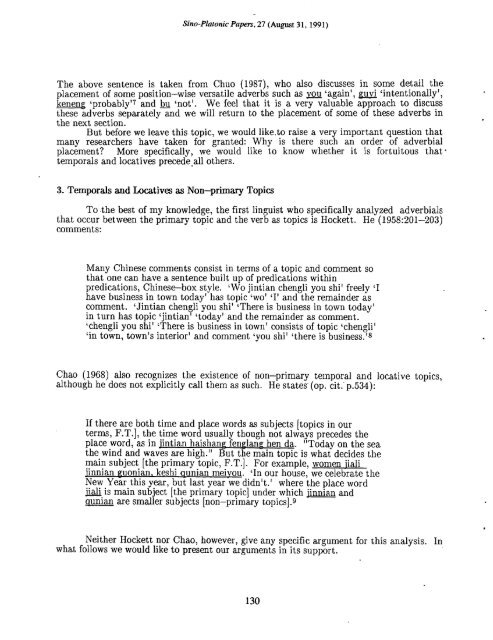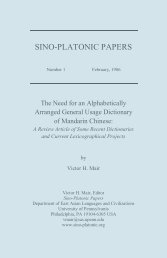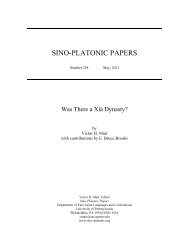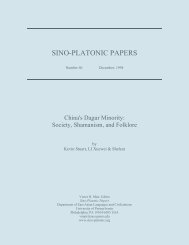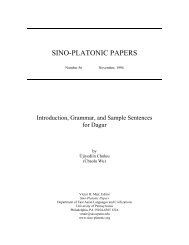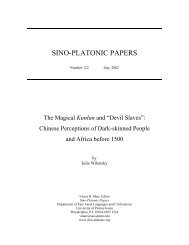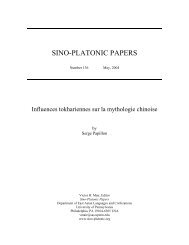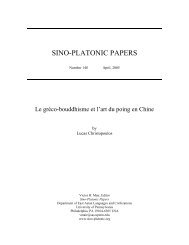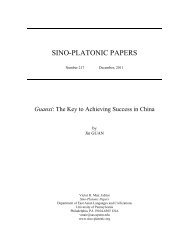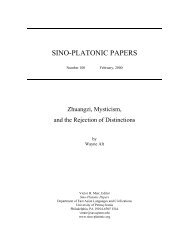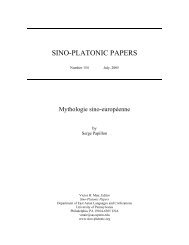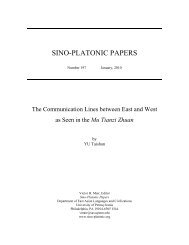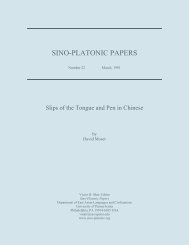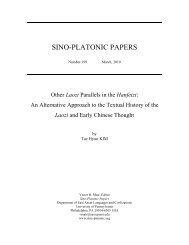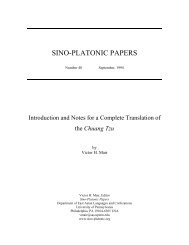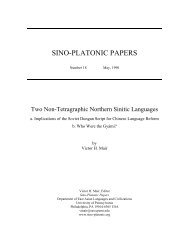Essays on Writing and Language in Honor - Sino-Platonic Papers
Essays on Writing and Language in Honor - Sino-Platonic Papers
Essays on Writing and Language in Honor - Sino-Platonic Papers
Create successful ePaper yourself
Turn your PDF publications into a flip-book with our unique Google optimized e-Paper software.
S<strong>in</strong>o-Plat<strong>on</strong>ic Papos, 27 (August 3 1,199 1)<br />
The above sentence is taken from Chuo (1987), who also discusses <strong>in</strong> some detail the<br />
placement of some posit i<strong>on</strong>-wise versatile adverbs such as 'aga<strong>in</strong>', gu yi '<strong>in</strong> tent i<strong>on</strong>ally',<br />
'probablyt7 <strong>and</strong> 'not'. We feel that it is a very valuable approach to discuss<br />
these adverbs separately <strong>and</strong> we will return to the placement of some of these adverbs <strong>in</strong><br />
the next secti<strong>on</strong>.<br />
But before we leave this topic, we would 1ike.to raise a very important questi<strong>on</strong> that<br />
many researchers have taken for granted: Why is there such an order of adverbial<br />
placement? More specifically, we would like to know whether it is fortuitous that-<br />
temporals <strong>and</strong> locatives precede-all others.<br />
3. Temporals <strong>and</strong> Locatives as NOR-primary Topics<br />
To the best of my knowledge, the first l<strong>in</strong>guist who specifically analyzed adverbials<br />
that occur between the primary topic <strong>and</strong> the verb as topics is Hockett. He (1958:201-203)<br />
comments:<br />
Many Ch<strong>in</strong>ese comments c<strong>on</strong>sist <strong>in</strong> terms of a topic <strong>and</strong> comment so<br />
that <strong>on</strong>e can have a sentence built up of predicati<strong>on</strong>s with<strong>in</strong><br />
predicati<strong>on</strong>s, Ch<strong>in</strong>ese-box style. 'Wo j<strong>in</strong>tian chengli you shi' freely 'I<br />
have bus<strong>in</strong>ess <strong>in</strong> town today' has topic 'wo' '1' <strong>and</strong> the rema<strong>in</strong>der as<br />
comment. 'J<strong>in</strong>tian chengli you shi' 'There is bus<strong>in</strong>ess <strong>in</strong> town today'<br />
<strong>in</strong> turn has topic 'j<strong>in</strong>tian' 'today' <strong>and</strong> the rema<strong>in</strong>der as comment.<br />
'chengli you shi' 'There is bus<strong>in</strong>ess <strong>in</strong> town' c<strong>on</strong>sists of topic 'chengli'<br />
'<strong>in</strong> town, town's <strong>in</strong>terior' <strong>and</strong> comment 'you shi' 'there is bus<strong>in</strong>ess.'8<br />
Chao (1968) also recognizes the existence of n<strong>on</strong>-primary temporal <strong>and</strong> locative topics,<br />
although he does not explicitly call them as such. He states' (op. cit. p.534):<br />
If there are both time <strong>and</strong> place words as subjects [topics <strong>in</strong> our<br />
terms, F.T.], the time word usually though not always precedes the<br />
place word, as <strong>in</strong> j<strong>in</strong>tian haishang fenglang hen da. "Today <strong>on</strong> the sea<br />
the w<strong>in</strong>d <strong>and</strong> waves are high." But the ma<strong>in</strong> topic is what decides the<br />
ma<strong>in</strong> . subject [the primary topic, F.T.]. For example, women iiali<br />
jlnnian au<strong>on</strong>ian. keshi aunian meivou. 'In our house, we celebrate the<br />
New Year this year, but last year we didn't.' where the place word<br />
jiali is ma<strong>in</strong> subject [the primary topic] under which j<strong>in</strong>nia,n <strong>and</strong><br />
ounian are smaller subjects [n<strong>on</strong>-primary topics] .9<br />
Neither Hockett nor Chao, however, give any specific argument for this analysis. In<br />
what follows we would like to present our arguments <strong>in</strong> its support.


